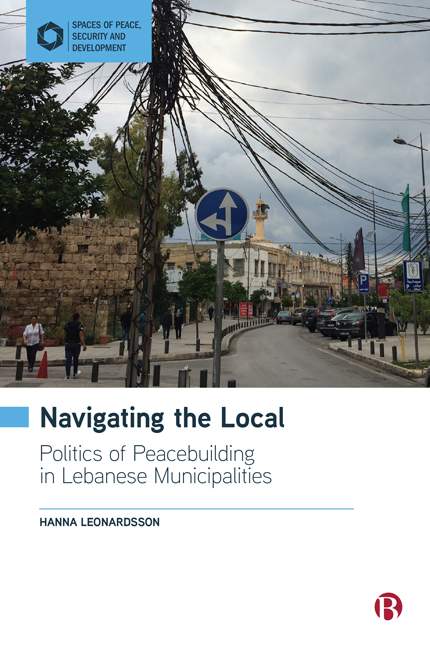Book contents
- Frontmatter
- Contents
- Acknowledgements
- Introduction
- 1 Theorizing Local Peacebuilding
- 2 Lebanese Municipalities, Centralized Peacebuilding and Possibilities for Change
- 3 Service Delivery: Providing for Local Needs
- 4 Local Interactions: Formal and Informal Everyday Interactions
- 5 Vertical Relationships: Connecting the Local to the National and Global
- Conclusion
- References
- Index
2 - Lebanese Municipalities, Centralized Peacebuilding and Possibilities for Change
Published online by Cambridge University Press: 17 January 2024
- Frontmatter
- Contents
- Acknowledgements
- Introduction
- 1 Theorizing Local Peacebuilding
- 2 Lebanese Municipalities, Centralized Peacebuilding and Possibilities for Change
- 3 Service Delivery: Providing for Local Needs
- 4 Local Interactions: Formal and Informal Everyday Interactions
- 5 Vertical Relationships: Connecting the Local to the National and Global
- Conclusion
- References
- Index
Summary
From 1975 to 1989, a violent civil war raged on Lebanese territory, killing 150,000– 170,000 people, displacing large portions of the population (with estimates of two-thirds of Lebanese), vastly destroying infrastructure and bringing the Lebanese state close to collapse (Khalaf, 2002, p 232; Leenders, 2012, p 1). As the war came to an end in 1989, the Ta’if Peace Agreement reaffirmed power-sharing between former warring elites and a sectarian influence over Lebanese politics.
While Lebanon's tale is often told through power-sharing arrangements, external influence or reoccurring violence characterized by sectarianism, its post-war development is both a success story and a complete failure, and everything in between. In recent years, Lebanon has seen increased political debates, economic success, the growth of a Lebanese middle class, and a phoenix of coexistence, resilience and a joy of life. At the same time, there have been political assassinations, inter- and intra-state hostilities, fatal political ignorance, massive public protests and economic decline (Harb and Fawaz, 2020; Khalaf, 2012; World Bank, 2021). At the same time, postwar developments are embedded by Lebanon's geopolitical position which encourages international involvement. And, depending on the preference of the interpreter, such involvement is believed to maintain its stability or delay further moves towards peace (Mac Ginty, 2007b; Nagel and Staeheli, 2015).
The Lebanese state may appear weak due to the many ways in which sectarian power intrudes on the sovereignty of the state. However, because of the sectarian divide and the need for individuals to embrace personal links to their sectarian elites in order to claim their share of public resources (wasta), the Lebanese state has implications in people's lives. Thus, as sectarianism is a way of life and influenced by life, sectarianism is constantly reproduced as a political tool, one that the political elite has continuously used to resist reform (Egan and Tabar, 2016; Khalaf, 2002; Nucho, 2016). The past few years have vividly illustrated the obsession with sectarian divides and a political system that focuses on dialogue and unity between elites but overlooks problems associated with the provision of a good life for all Lebanese people (Khalaf, 2012, p 18).
- Type
- Chapter
- Information
- Navigating the LocalPolitics of Peacebuilding in Lebanese Municipalities, pp. 32 - 53Publisher: Bristol University PressPrint publication year: 2023



